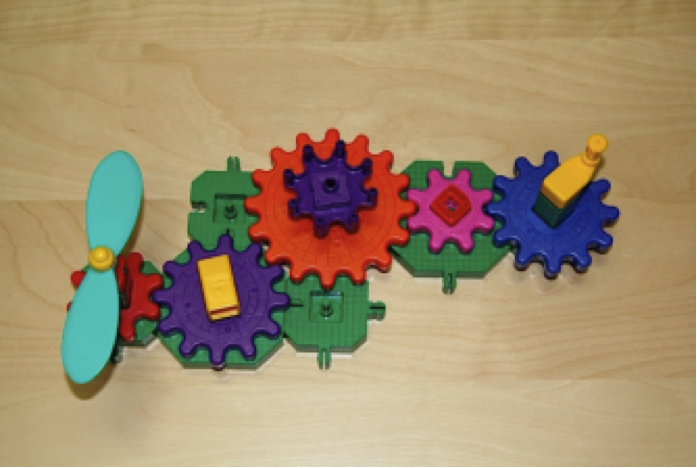When Do Kids Learn Cause And Effect

Want to aid kids learn? Ask them to explicate what they are learning in their own words!
New research1 has establish that when children are asked to come upward with explanations (fifty-fifty simply to themselves) while learning, they are able to connect new ideas with prior cause-and-effect noesis improve than those who are not encouraged to explore and explain. Past forming their own generalizations, children can more efficiently understand new information.
Children begin to develop cause-and-upshot thinking skills equally early every bit 8 months of age2. Cause-and-effect thinking, or causality, allows us to make inferences and reason about things that happen effectually united states of america. Causality helps us empathize things as simple as "If I don't water the plants they'll dice" to things more complicated such equally other people's intentions and behaviors. When children empathize cause and outcome, they also begin to sympathize the operation of mechanisms, which allows them to empathize causal relationships. When a child asks "why" for the starting time time, this question more than than likely coincides with their get-go endeavor to explain something. Request "why" helps children fill in the blanks (and then to speak), assuasive them to fully sympathise both the cause and effects and mechanisms of the new state of affairs or information they've been presented with3.
Educational research has found that cocky-explaining (explaining to oneself or to another person) can be more than effective for learning than other activities – such as repeatedly reading over materials or thinking aloud4,v. While most of the research on self-explanation has focused primarily on older children and adults, at that place are some studies on younger children that have shown the positive effects information technology can take. For example, research with elementary school children has shown that in comparing to other learning activities, such as solving practice problems, self-explanation was shown to enhance children's conceptual and procedural knowledge about a given task or concepthalf-dozen.
Why is information technology important to focus on younger children?
Research has shown that cocky-caption is really only beneficial when we are presented with new concepts that we aren't well informed of7. Considering young children are just beginning to experience the world, they stand up to benefit well-nigh from self-explanation.
In order to examine the benefits of caption-based learning further, Christine Legare and Tania Lombrozo implemented two studies. In each written report, they presented preschoolers (age 3 to six) with a mechanical toy made upward of colorful, interlocking gears that had a propeller on one end and a crank on the other. After a researcher showed the children how the toy worked, each child was given an opportunity to have the machine apart and to put information technology back together again. Children were then asked to either notice or explain the mechanisms of the toy (in study one) or were asked to describe or explain the machine to the researcher (in study 2).

Mechanical Toy used in Legare and Lombrozo's (2014) report
Both studies found that the children (regardless of historic period) who were asked to explain the toy outperformed the other children in understanding the cause and effect operations of the toy. For example, if a part was unknowingly removed from the toy by the researcher, the children in the explain status were able to figure out and understand why this was happening more so than children in the other groups.
The children who were asked to explain were besides better at rebuilding the toy and were able to transfer this new noesis to other learning tasks presented to them. Nevertheless, they found that explaining does not improve memory for details: children who were asked to explicate were often mistaken when asked to think the toy's size, shapes, and colors.
Why did the children who were asked to explicate excel in agreement the toy's functionality, just fail when it came to remembering its details? Legare suggest that the process of explaining causes the child to focus more on agreement the cause-and-effect mechanisms rather than the concrete details. Self-explanation may help kids learn by forcing their minds to grapple with the underlying concepts, causing them to discover connections that they may have otherwise overlooked.
Previous research by Legare and colleagues8, 9 has found that preschoolers are especially prone to attempt self-explanation when they encounter new data that contradicts their worldview. When children are presented with inconsistent outcomes, it prompts them to remember about all possibilities (even unseen and hidden mechanisms). The explanations they come up up with and then inspire them to desire to actively test their hypotheses. These results were observed in children as immature as two years oldx.
While much is still unknown about the role of explanation in early childhood learning, information technology's clear that explaining may exist valuable because information technology makes us enlightened of what we don't notwithstanding understand. These studies have as well shown that self-explanation engages young learners in ways that other cerebral procedure exercise non (such equally observing and describing).
"Understanding the ways in which caption does — and does not — improve learning speaks not only to questions almost the development of cause-and-effect knowledge, merely likewise to questions about how to most effectively harness explanation for use in educational interventions," Legare says.
When teachers and parents ask children to explicate "why" and "how" something works, they are giving the child the opportunity to remember like scientists.
This process is effective both in the classroom and at domicile. Past allowing children to gather evidence through exploration and understand it through explanation, it provides them with insights into the development of scientific reasoning – assuasive them to harness their potential for scientific reasoning and better their critical thinking skillsviii. Additionally, considering children may explore more than when asked for explanations regularly, informal learning environments like children's museums are a great place for children to hone in on these abilities.
So the adjacent time your child or educatee asks you to explain "why" or "how" when learning something new – inquire them! You'll be helping them more yous (or they) realize.
References
- Legare C.H. and Lombrozo T. (2014). Selective effects of caption on learning during early babyhood. Journal of Experimental Child Psychology 126: 198-212. [Article]
- Sobel, D. M., & Kirkham, Due north. Z. (2006). Blickets and babies: The development of causal reasoning in toddlers and infants. Developmental Psychology, 42, 1103-1115. [Article]
- Keil, F. C. (2012). Running on empty? How folk science gets by with less. Electric current Directions in Psychological Scientific discipline, 21, 329-334. [Article]
- Fonseca, B. & Chi, M. T. (2011). The self-explanation issue: A constructive learning activity. In Mayer, R. & Alexander, P. (Eds.), The Handbook of Inquiry on Learning and Didactics (pp. 296-321). New York, NY: Routledge Press. [Volume]
- Lombrozo, T. (2012). Explanation and abductive inference. J. Holyoak and R. G. Morrison (Eds.), Oxford Handbook of Thinking and Reasoning (pp. 260-276). Oxford, UK: Oxford University Press. [Commodity]
- McEldoon, K., Durkin, G., & Rittle-Johnson, B. (2012). Is self-explanation worth the time? A comparison to additional practice. British Journal of Educational Psychology, 83, 615- 632 [Article]
- Rittle-Johnson, B., Saylor, M., and Swygert, M.E. (2008). Learning from explaining: does information technology matter if mom is listening? Journal of Experimental Child Psychology, 100(iii): 215-24. [Commodity]
- Legare CH, Gelman SA, and Wellman HM. (2010). Inconsistency with prior knowledge triggers children's causal explanatory reasoning. Child Development, 81(3): 929-44. [Article]
- Legare C. 2012. Exploring explanation: explaining inconsistent prove informs exploratory, hypothesis-testing behavior in young children. Child Evolution, 83(1): 173-85. [Article]
- Legare, C. H. (2014), The Contributions of Explanation and Exploration to Children's Scientific Reasoning. Child Development Perspectives, 8: 101–106. [Article]
Further Reading
- Grotzer, T. (2003). Learning to Understand the Forms of Causality Implicit in Scientifically Accustomed Explanations. Studies in Scientific discipline Education, 39(1), 1-74 [Article]
- Grotzer, T. (2012). Learning Causality in a Circuitous Globe: Understandings of Consequence. [Book]
When Do Kids Learn Cause And Effect,
Source: https://www.learningandthebrain.com/blog/cause-and-effect/
Posted by: gogginsmakeles.blogspot.com


0 Response to "When Do Kids Learn Cause And Effect"
Post a Comment